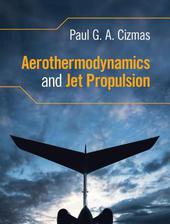
|
Aerothermodynamics and Jet Propulsion
Hardback
Main Details
| Title |
Aerothermodynamics and Jet Propulsion
|
| Authors and Contributors |
By (author) Paul G. A. Cizmas
|
| Physical Properties |
| Format:Hardback | | Pages:482 | | Dimensions(mm): Height 252,Width 194 |
|
| Category/Genre | Technical design
Mechanical engineering
Aerospace and aviation technology |
|---|
| ISBN/Barcode |
9781108480758
|
| Classifications | Dewey:629.132306 |
|---|
| Audience | | Tertiary Education (US: College) | |
|---|
| Illustrations |
Worked examples or Exercises
|
|
Publishing Details |
| Publisher |
Cambridge University Press
|
| Imprint |
Cambridge University Press
|
| Publication Date |
2 December 2021 |
| Publication Country |
United Kingdom
|
Description
Get up to speed with this robust introduction to the aerothermodynamics principles underpinning jet propulsion, and learn how to apply these principles to jet engine components. Suitable for undergraduate students in aerospace and mechanical engineering, and for professional engineers working in jet propulsion, this textbook includes consistent emphasis on fundamental phenomena and key governing equations, providing students with a solid theoretical grounding on which to build practical understanding; clear derivations from first principles, enabling students to follow the reasoning behind key assumptions and decisions, and successfully apply these approaches to new problems; practical examples grounded in real-world jet propulsion scenarios illustrate new concepts throughout the book, giving students an early introduction to jet and rocket engine considerations; and online materials for course instructors, including solutions, figures, and software resources, to enhance student teaching.
Author Biography
Paul G. A. Cizmas is Professor of Aerospace Engineering at Texas A&M University. Over the past 25 years, he has conducted research into numerical simulations of transport phenomena in propulsion systems, covering a large range of topics, including reduced-order modeling, aeroelasticity, combustion and computational fluid dynamics. He is a Fellow of American Society of Mechanical Engineers and an Associate Fellow of American Institute of Aeronautics and Astronautics.
Reviews'This text will serve both undergraduates interested in propulsion, and practicing engineers seeking a refresher in propulsion system analysis. It provides a careful derivation of the equations of jet propulsion extending to the basics of component design and aerodynamics. Cizmas really excels in breaking complicated systems into simple approximations with the most important details for hand calculations and back-of-the-envelope engineering.' Thomas Brenner, General Electric 'This textbook provides a comprehensive introduction to gas turbine engines, and is written by an author who appreciates the challenges students face when approaching the subject. All the necessary background material is developed in the first few chapters, while end-of-chapter exercises encourage readers to practice their understanding of the material.' Lakshmanan Narayanaswami, Embry-Riddle Aeronautical University 'Aerothermodynamics and Jet Propulsion builds the foundations of aerodynamics and thermodynamics and then uses those subjects to develop the reader's understanding of low and high speed air breathing and rocket engines. Usefully, this book also covers the basics of combustion. All areas of the text are supported by a number of considered and detailed worked examples that provide an excellent basis for the many questions provided at the end of each chapter.' Rob Howell, Sheffield University 'This book takes you on a journey through the fundamentals of Aerothermodynamics and Jet Propulsion, featuring well explained concepts, offering comprehensive explanations, and including ample derivations of the theoretical aspects behind the field of engineering propulsion. It is well written, easy to follow, and organized in a systematic manner. A delight to use and to have in your library.' Ali Abdul-Aziz, Kent State University 'Professor Cizmas systematically presents an introduction of jet propulsion from the perspectives of thermal and fluid mechanics principles. Although aimed at junior-level aerospace engineering students, this textbook will also be suitable for senior-level mechanical engineers. Part I of the book is particularly useful, as it reviews topics such as gas dynamics and combustion, which might not be covered comprehensively in a traditional junior-level mechanical engineering curriculum. In summary, I recommend this introductory textbook for courses on jet propulsion systems.' Chiang Shih, Florida State University
|